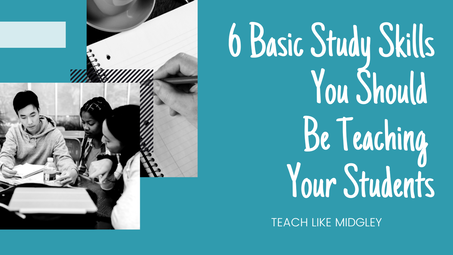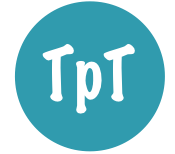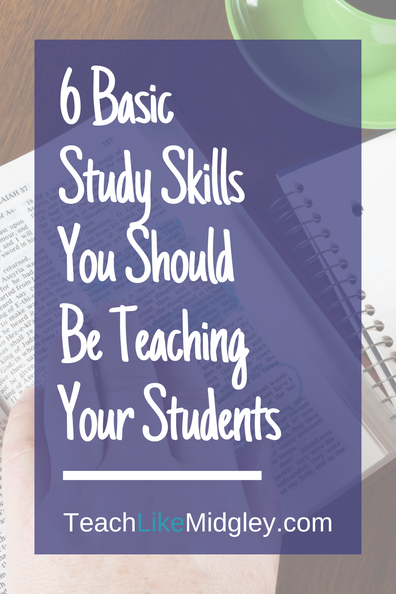6 Basic Study Skills You Should Be Teaching Your Students
Most people are aware that study skills are essential to academic success. As teachers, we know that students need skills to help them learn our content and curriculum.
Chances are high that you start your class with setting goals, to help students focus on their purpose for being in class.
You might even provide them with a study guide before their unit test.
Chances are high that you start your class with setting goals, to help students focus on their purpose for being in class.
You might even provide them with a study guide before their unit test.
But you may also be wondering what other study skills you should be teaching your students. After all, we know that study skills are essential learning skills that every student needs to find academic success. Once you read this post, you will know the six basic study skills that you should be teaching your students.
Goals & Priorities
Many teachers start their school year or class with traditional goal setting activities. These are great for helping students gain perspective of their purpose for being in class and focus on what they want to accomplish.
This study skill is actually a cycle. The problem, is that many teachers actually stop after only completing the first step: setting the goals.
There are some teachers who will go back and have students revisit their goals and reflect at the end of the unit, quarter, or school year. This is great, but you need to go further, because there’s more to it than just reflection.
You need to help students set goals and then create a plan to reach that goal. Without the plan, then the goal becomes quite arbitrary.
Creating the plan should include identifying priorities. These priorities are actions that are important and help students move towards their goals.
Once you help students create their plan, then be sure to build in check points, where they can self-check if their plan is working.
The entire cycle includes: setting the goal, creating a plan to reach the goal, executing the plan, revisiting progress, adjusting the plan as needed, then reflection once the goal is met.
This study skill is actually a cycle. The problem, is that many teachers actually stop after only completing the first step: setting the goals.
There are some teachers who will go back and have students revisit their goals and reflect at the end of the unit, quarter, or school year. This is great, but you need to go further, because there’s more to it than just reflection.
You need to help students set goals and then create a plan to reach that goal. Without the plan, then the goal becomes quite arbitrary.
Creating the plan should include identifying priorities. These priorities are actions that are important and help students move towards their goals.
Once you help students create their plan, then be sure to build in check points, where they can self-check if their plan is working.
The entire cycle includes: setting the goal, creating a plan to reach the goal, executing the plan, revisiting progress, adjusting the plan as needed, then reflection once the goal is met.
Student Organization
Middle schoolers are notorious for being unorganized. If you spend any time looking into child development, you’ll notice that middle school students are at an ideal stage for learning this skill.
You are likely immediately thinking about crumpled papers, binders with nothing in the dividers, and lost assignments. Organizing school materials is definitely something students need help with.
The best approach, is to create a simple system. Help students set up this system, and then also help them maintain this system throughout the school year.
But organization is more than just school supplies. It’s also about helping students learn to organize information. Your students will find a lot of success with your content if you teach them how to organize it. Teaching with a structure is the easiest way to accomplish this.
You can read here all about how I teach ancient history with a structure.
You are likely immediately thinking about crumpled papers, binders with nothing in the dividers, and lost assignments. Organizing school materials is definitely something students need help with.
The best approach, is to create a simple system. Help students set up this system, and then also help them maintain this system throughout the school year.
But organization is more than just school supplies. It’s also about helping students learn to organize information. Your students will find a lot of success with your content if you teach them how to organize it. Teaching with a structure is the easiest way to accomplish this.
You can read here all about how I teach ancient history with a structure.
Time Management
We all know someone who struggles with time management, young and old alike! But the truth is, time management is a skill and can be learned.
As teachers, we have an opportunity to teach this to our students. An easy time to do this is during student work time. Have students help estimate how long they think a task should take. After that time frame, check in with students. Was it too much time? Was it not enough time? And discuss how to adjust the time frame.
Most importantly, encourage students to learn from the experience, make adjustments, and move forward. You never want to make students feel bad because they need more time.
As teachers, we have an opportunity to teach this to our students. An easy time to do this is during student work time. Have students help estimate how long they think a task should take. After that time frame, check in with students. Was it too much time? Was it not enough time? And discuss how to adjust the time frame.
Most importantly, encourage students to learn from the experience, make adjustments, and move forward. You never want to make students feel bad because they need more time.
Reading & Note-Taking Skills
There are entire blogs dedicated to this topic. Reading skills and note-taking skills are definitely well known study skills. But for purposes of this post, we will keep it brief.
Reading skills are essential and should be taught in every class – in my humble opinion. Every subject has different types of text that students need to navigate.
One part of reading skills I believe is often overlooked, are pre-reading strategies. You can easily teach and model these skills with your students anytime you are about to read a new text.
By the way, if you aren’t teaching your students how to use their textbooks, then you are doing them a DISSERVICE! Even if you think textbooks are not trendy and hands-on teaching methods are way more cool – let me tell you that textbooks are part of learning and your students need to know how to use them.
Note-taking skills often go hand in hand with reading. And is yet another study skill we can learn.
The best way to approach teaching this skill to students is to provide structure, and model for students how to do it.
The Cornell Note-Taking Structure is my absolute favorite for teaching students. I love that you can simplify the structure and have the flexibility to modify it for students.
Reading skills are essential and should be taught in every class – in my humble opinion. Every subject has different types of text that students need to navigate.
One part of reading skills I believe is often overlooked, are pre-reading strategies. You can easily teach and model these skills with your students anytime you are about to read a new text.
By the way, if you aren’t teaching your students how to use their textbooks, then you are doing them a DISSERVICE! Even if you think textbooks are not trendy and hands-on teaching methods are way more cool – let me tell you that textbooks are part of learning and your students need to know how to use them.
Note-taking skills often go hand in hand with reading. And is yet another study skill we can learn.
The best way to approach teaching this skill to students is to provide structure, and model for students how to do it.
The Cornell Note-Taking Structure is my absolute favorite for teaching students. I love that you can simplify the structure and have the flexibility to modify it for students.
Managing Multi-Step Projects
You may be thinking managing projects is more about time management, and in some ways, it is. But handling multi-step and multi-day projects is a whole other skill our students need help with managing.
When in elementary school, most students are guided through these types of projects step by step. Then when they get to middle school, they are expected to do this on their own for history projects, science projects, book reports, etc. On top of all the other overwhelm they are trying to manage.
One of the easiest ways to help students manage these projects is to provide a Project Guide that includes a timeline for the required steps.
Understanding which steps take more time is a skill where students can benefit from some guidance.
When in elementary school, most students are guided through these types of projects step by step. Then when they get to middle school, they are expected to do this on their own for history projects, science projects, book reports, etc. On top of all the other overwhelm they are trying to manage.
One of the easiest ways to help students manage these projects is to provide a Project Guide that includes a timeline for the required steps.
Understanding which steps take more time is a skill where students can benefit from some guidance.
Taking Tests
Whether you are personally Pro-Test or Anti-Test, it doesn’t matter – the fact remains that tests are part of our culture and if you want to see your students succeed then you need to prepare them.
If you never go through Test Mode until a state assessment, then you are piling unnecessary stress on your students.
The more you can get your students accustomed to being in Test Mode, the easier time they will have. As the teacher, you have the power to help your students handle tests.
BTW – if you don’t already have a Test Mode Procedure, then go grab mine here, for FREE.
Having a review day, providing a quality study guide, practicing study strategies with students throughout the unit, informing students what to expect on test day, and actually conducting test days are all easy things you can do to help students develop their test taking skills.
If you never go through Test Mode until a state assessment, then you are piling unnecessary stress on your students.
The more you can get your students accustomed to being in Test Mode, the easier time they will have. As the teacher, you have the power to help your students handle tests.
BTW – if you don’t already have a Test Mode Procedure, then go grab mine here, for FREE.
Having a review day, providing a quality study guide, practicing study strategies with students throughout the unit, informing students what to expect on test day, and actually conducting test days are all easy things you can do to help students develop their test taking skills.
Final Thoughts...
Acquiring good study skills is essential for every student, regardless of his or her age or educational level. Good study skills will help students succeed in school and beyond. Many students think that they can get by without developing good study habits, but this is usually not the case.
As the teacher, you can incorporate these skills into your daily routines. And if you are looking for materials to help you do exactly that, then be sure to check out my professional development training for teachers: How to Integrate Study Skills
As the teacher, you can incorporate these skills into your daily routines. And if you are looking for materials to help you do exactly that, then be sure to check out my professional development training for teachers: How to Integrate Study Skills
You May Also Like...
Let's Connect...

Welcome! I'm Hillary Midgley, a veteran 6th grade teacher.
I create educational materials and develop curriculum for other teachers. I specialize in teaching students how to learn through my Study Skills Curriculum. I have established fundamental classroom systems and structures for teachers to help them streamline their classroom. And my passion is teaching ancient history through engaging activities with foundations in academic skills. Here you will find resources on all of these topics and more. Learn more about me here.
|







